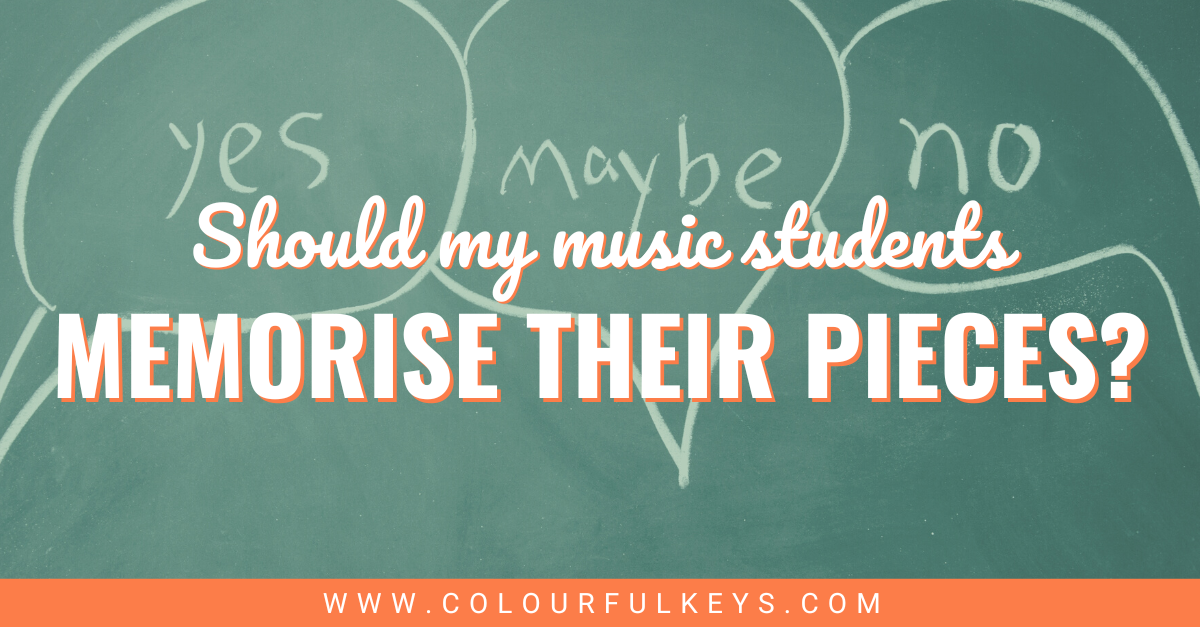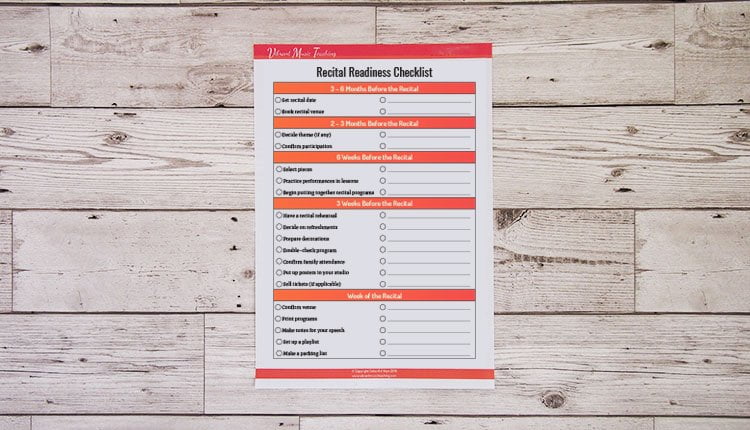
Broc Hite is a piano instructor, church organist, and website developer based in northwest Arkansas, USA. He grew up in New York, where he earned a BFA in Piano Performance from Purchase College and an MM in Collaborative Piano from The Juilliard School. Broc worked for many years as a software engineer/data analyst and earned his MBA at the University of Connecticut. To learn more about Broc, visit brochite.com.
Memorisation is a controversial subject among piano teachers. Some swear by it. Others avoid it at all costs. I propose that memorisation has a place in teaching, but should be used flexibly instead of arbitrarily.

Most professional artists who memorise their programs are performing the same works in multiple cities. Even if they have a large repertoire, they’re playing a limited amount of it during any particular performance.
It’s a bit like a museum rotating its collection, storing much of it out-of-sight in a vault. You may never see it, but it’s still there. 🫣
Yes, there is a time and place for memorisation. But since a lot of us don’t work with professional concert pianists, let’s be practical and look at both sides of the great music teacher debate: to memorise, or not?
Team “Play by Heart”
People who endorse memorising performance pieces have history on their side. With musical greats like Clara Schumann and Franz Liszt as examples, it’s no wonder folks cheer for the memorisation team.
But it’s not simply tradition that drives us to encourage students to memorise their pieces – there are quite a few advantages, in fact.
Piece Polishing
There are some students who regard practice as an occasional (instead of a regular) activity. Sometimes I require the “I’ll-practise-when-I-absolutely-have-to” students to memorise a piece just because I know it’s the only way they’ll thoroughly learn a recital piece.
The expectation of having to play from memory is often enough to encourage sufficient practice!
But when it comes time for performance, I’m diplomatic enough to let the student make the final decision on playing with or without the score. Either way, the added practice which came from the memorisation assignment will serve them well.
Arrested Regression
Students who have memorised a piece tend to play better than they do when they use the music.

I don’t have a large sample size on this theory, but I’ve noticed that when my students play from the score, they often regress. When they can see the music, they want to correct minor mistakes they wouldn’t have bothered with if they’d played from memory.
Removing the score elevates concentration and listening, making the performance better.
Self-Satisfaction
Some students enjoy memorising music because it gives them a sense of accomplishment.
Committing a piece to memory is a lot of work. But some students get a real kick out of raising a flag at the top of “Mount Memory”.
(Oh, by the way, the VMT Printable Library has a great game to reinforce memorisation called ’Mount Memory’. 😉)
This is where a teacher needs to put aside personal feelings and tune in to the desires of the student. If they want to memorise, why argue the point?
Just in Case…
It’s a good habit for students to have a few pieces memorised and at the ready so they’ll be prepared for any performance possibility that may arise.
I have some students who like playing in music festivals where memorisation is required. If they have repertoire that would be appropriate for an event in the future, I suggest they memorise it from the start.
In addition, if students are in the groove of memorising, they’ll have things prepared to play at piano parties, recitals, family gatherings etc.
Are YOU ready for an upcoming recital? Enter your info below and the Vibrant Music Teaching team will send you the ‘Recital Readiness Checklist’ to plan your next event easily!

Subscribe to updates and get the Recital Readiness Checklist
Enter your details to subscribe to the newsletter for piano teachers with information, tips and offers.
I hate spam as much as you do! I’ll only send you information that’s directly relevant to music teachers and you can unsubscribe at any time.
VMT members can download the checklist from the VMT Library. Not a member? Learn more and join today at www.vibrantmusicteaching.com.
Team “Use the Score”
There are many reasons why, as a teacher, you might be against having your students memorise their music.
You might think playing by heart is old-fashioned, or just for the concert pianist crowd. Maybe you don’t like asking students to memorise since it can be like pulling teeth to get some of them to do it. Or it could be a fear of what might happen when a student’s memory fails. 😲
All of those are legitimate concerns, but here are some others you might not have even thought of.
Repertoire Restrictions
Taking valuable teaching time to help students memorise limits your ability to teach other pieces. And if It’s for a one-off performance, it seems silly to focus on just one thing simply because memorisation is expected.
Many students don’t want to commit time, effort and energy to just one piece merely so they can play it by heart. This is especially true when they have diverse interests and want to learn a variety of styles.
Apprehensive Audience
Looking at some of our modern literature, particularly pieces written in the early- to mid-20th century, there are some that are very difficult to memorise because they don’t have predictable patterns.
Just because a recital includes music from a variety of eras and styles doesn’t mean every piece has to be memorised.
After seeing a major pianist badly stumble through Berg’s Piano Sonata, Op. 1, I realised that I would have easily accepted the piece played well from the score rather than watching on pins-and-needles hoping that the artist made it to the final chord.
It makes sense that we don’t want our studio recital audiences to feel that same level of unease as they watch their cherished child or loved one perform.

Do you have students who need a little extra help memorising their music? Need to refresh your toolkit of memorisation strategies? Check out Nicola’s ‘Piano Practice’ hub page, which has an entire section of advice and resources devoted to memorising music.
Performance Anxiety
Let’s face it: Some students just naturally memorise, whereas for others it’s a big challenge. Forcing the issue for recitals or other events could result in significant performance anxiety, and an even worse performance.
For students who don’t participate in festivals, I try to find out if they like to memorise or not. For semester-ending recitals, I always encourage all of my students to memorise one piece, but I don’t require it.
If it’s a choice between a confident student using the score and an incredibly nervous one with a memorised piece, I choose the former every time.
Memorisation Considerations
If you’re involved with a particular exam system and it requires pieces to be memorised, then you’ll certainly expect your students to wear the “Play by Heart” jersey.
When it comes to recitals, do other local teachers typically memorise, or are they cheerleaders for the “Use the Score” team? You’ll find that families often want to see from your studio what they’ve seen from their friends’ or relatives’ music teacher, whether that is students who memorise or not.
Just remember: No matter which team you choose, take the occasion and your area’s musical culture into account and prepare your students accordingly.

Which side of the “memorise or not” music teacher debate do you fall on?
I’d love to hear if you’re on team “Use the Score” or team “Play by Heart” in the comments below.